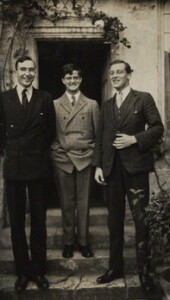We found some pages cut out from an undated issue of The Contemporary Reviewin the Jot 101 archive the other day. These seven pages contain an article by A. L. Rowse entitled ‘All Souls Stories’, and like so many of the historian’s writings on his old college, mix amusing gossip with valuable reflections on academic bad behaviour.
All Souls, as Rowse admits, has always aroused curiosity and astonishment from outsiders, including those from the University itself. Why are some graduate contenders elected and others rejected? Is success in a formal examination the sole route to a life fellowship? What part did the legendary cherry stone problem play in the process? If fellows are the crème de la crème of academic excellence at the University and beyond it, why is it that some Fellows are evidently not of this calibre ?
Rowse gives an example of one particular Fellow whose behaviour suggested that he was not up to the job, Sir ( later Viscount) John Simon. For some reason this nitwit managed to be appointed Home Secretary, Foreign Secretary, Chancellor of the Exchequer and Lord Chancellor, while being ‘ not much good’ in any of these posts, according to Rowse, who obviously knew the man well enough to make this judgment. Rowse recalls him addressing the Junior Fellows in an attempt at bonhomie, while managing to get their names all wrong. Then there was the time that the newly married Simon and his wife arrived at what they thought was the home of Lord Courtney, a pro-Boer politician, only to find that they had come to the home of W.L.Courtney, then editor of The Fortnightly Review. There was also the time that Simon found himself talking in ‘ labourious’ French to the French Ambassador, who turned out to be Frederick Kenyon, Director of the British Museum. Simon, according to Rowse, also made a mess of handling Hitler and Mussolini. Rowse charitably called this incompetence examples of Simon being ‘ accident prone ‘.Most non-All Souls men would see them as acts of blithering idiocy. Continue reading



